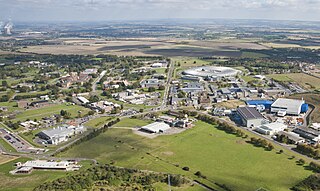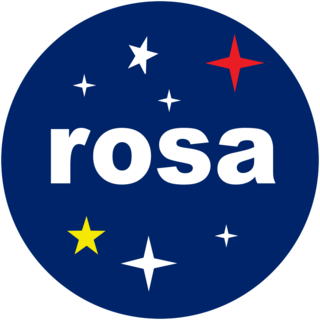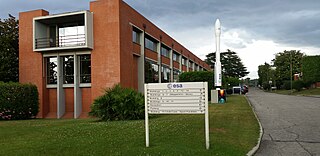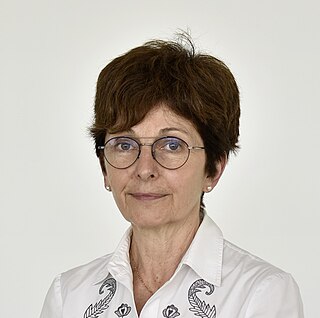Related Research Articles

The European Space Agency (ESA) is a 22-member intergovernmental body devoted to space exploration. With its headquarters in Paris and a staff of around 2,200 people globally as of 2022, ESA was founded in 1975. Its 2024 annual budget was €7.8 billion.

The British National Space Centre (BNSC) was an agency of the Government of the United Kingdom, organised in 1985, that coordinated civil space activities for the United Kingdom. It was replaced on 1 April 2010 by the UK Space Agency.

The Rutherford Appleton Laboratory (RAL) is one of the national scientific research laboratories in the UK operated by the Science and Technology Facilities Council (STFC). It began as the Rutherford High Energy Laboratory, merged with the Atlas Computer Laboratory in 1975 to create the Rutherford Lab; then in 1979 with the Appleton Laboratory to form the current laboratory.

The European Space Astronomy Centre (ESAC) near Madrid in Spain is the ESA's centre for space science. It hosts the science operation centres for all ESA astronomy and planetary missions together with their scientific archives. Past and present missions represented at ESAC include Akari, BepiColombo, Cassini–Huygens, Cluster, Exomars, Gaia, Herschel Space Observatory, Hubble Space Telescope, ISO, INTEGRAL, IUE, James Webb Space Telescope, LISA Pathfinder, Mars Express, Planck, Rosetta, SOHO, Solar Orbiter, Venus Express, and XMM-Newton.
The European Space Tracking (ESTRACK) network consists of a number of ground-based space-tracking stations belonging to the European Space Agency (ESA), and operated by the European Space Operations Centre (ESOC) in Darmstadt, Germany. The stations support various ESA spacecraft and facilitate communications between ground operators and scientific probes such as XMM-Newton, Mars Express, BepiColombo, Gaia. Similar networks are run by the USA, China, Russia, Japan, and India.

The European Astronaut Centre (EAC), is an establishment of the European Space Agency and home of the European Astronaut Corps. It is near to Cologne, Germany, and is subdivided into six separate arms, these being Astronaut Training, Space Medicine, Astronaut Management, Human Exploration of the Moon as part of the Spaceship EAC initiative and Communications. It provides training facilities for European and international partner astronauts, particularly regarding ESA hardware for the ISS such as Columbus and formerly the ATV. The overall European Astronaut Centre organisation is also in charge of the organisation of the training of European astronauts in the centers of other partners, such as the United States, Russia, Canada (Saint-Hubert) or Japan (Tsukuba).

The Romanian Space Agency is a public institution that coordinates Romania's national space technology research programs and activities related to space research. ROSA, established in 1991, is subordinate to the Romanian Ministry of Education.
ESR Technology was formerly the engineering, safety and risk business of AEA Technology, which was formed from the commercial arm of the United Kingdom Atomic Energy Authority. It specializes in the provision of technical expertise, products, and services to help customers ensure asset integrity, improve machine reliability, manage safety and risk, and transfer best practice. It has customers across many sectors, including oil and gas, rail, utilities, aviation, and space and defence. It operates three centres of excellence: the National Centre of Tribology, European Space Tribology Laboratory, and the National Non-Destructive Test Centre.
The Science and Technology Facilities Council (STFC) is a United Kingdom government agency that carries out research in science and engineering, and funds UK research in areas including particle physics, nuclear physics, space science and astronomy.

Thales Alenia Space is a joint venture between the French technology corporation Thales Group (67%) and Italian defense conglomerate Leonardo (33%). The company is headquartered in Cannes, France.

The Atlas Computer Laboratory on the Harwell, Oxfordshire campus shared by the Harwell Laboratory was one of the major computer laboratories in the world, which operated between 1961 and 1975 to provide a service to British scientists at a time when powerful computers were not usually available. The main user population was the UK universities and some government agencies.

The Harwell Science and Innovation Campus is a 700-acre science and technology campus in Oxfordshire, England. Over 6,000 people work there in over 240 public and private sector organisations, working across sectors including Space, Clean Energy, Life Sciences and Quantum Computing.

The ESA Centre for Earth Observation is a research centre belonging to the European Space Agency (ESA), located in Frascati (Rome) Italy. It is dedicated to research involving earth observation data taken from satellites, among other specialised activities. The establishment currently hosts the European Space Agency's development team for the Vega launcher.
The United Kingdom Space Agency (UKSA) is an executive agency of the Government of the United Kingdom, responsible for the United Kingdom's civil space programme. It was established on 1 April 2010 to replace the British National Space Centre (BNSC) and took over responsibility for government policy and key budgets for space exploration; it represents the United Kingdom in all negotiations on space matters. The Agency "[brings] together all UK civil space activities under one single management". It is based at the former BNSC headquarters in Swindon, Wiltshire.
ARTES 20 Integrated Applications Promotion (IAP) was a European Space Agency programme that supported the development of services utilizing space assets, such as satellite navigation, communication or earth observation, with terrestrial systems. Many successful projects and studies created user-driven applications around solving particular problems or opportunities instead of creating technological solutions.
Telespazio UK Ltd. is a British space company based in Luton, Bedfordshire. Founded in 1978 by a small group of engineers at the European Space Operations Centre (ESOC) in Darmstadt, Germany, VEGA presently works with various space agencies, satellite operators and manufacturers around the world. It works with the European Space Agency (ESA) and ESOC in Germany, European Space Research and Technology Centre (ESTEC) in Noordwijk, the Netherlands, ESA Centre for Earth Observation (ESRIN) in Rome, Italy, and European Space Astronomy Centre (ESAC) in Madrid, Spain.

Magali Vaissière was Director of Telecommunications and Integrated Applications at the European Space Agency (ESA), from 2008 until 2020. She was responsible for the agency's programme of Advanced Research in Telecommunications System (ARTES).
Eutelsat Quantum is a communications satellite developed in the framework of a public-private partnership between the European Space Agency, Eutelsat and Airbus Defence and Space. Operated by Eutelsat, its design allows for it to reconfigure its radios coverage zone and alter its performance according its needs. It is located in a geostationary orbit and its longitude may be modified to cover any region in the world.

In May 2021, the Space industry of Scotland consisted of 173 space companies operating across Scotland. These include spacecraft manufacturers, launch providers, downstream data analyzers, and research organisations. Space Scotland, the countries space agency, said that the space industry in Scotland contributes in excess of £4 billion to the Scottish economy.
The domain of international space politics gained significant traction during the Cold War. This was largely fuelled by the ongoing space race between the USA and the USSR. At this time in history, space exploration was an endeavour largely restricted to the global superpowers and seemed out of reach for many smaller, developing, nations to actively participate in. Subsequently, public concerns for the cost of research and development into novel space technologies did not receive sufficient policy and academic attention in Africa. As the Cold War reached its conclusion, political power began to diffuse across the world, and this led to many smaller nation states developing national and regional space capabilities. In the context of Africa, Nigeria, Algeria, Egypt and South Africa were the front-runners in terms of investments into space-related research and development.
References
- ↑ "New Head of European Space Agency UK centre ECSAT". European Space Agency. 16 July 2013.
- ↑ "ECSAT". European Space Agency. 17 June 2020.
- ↑ "Climate Change Initiative". European Space Agency. 29 July 2018.